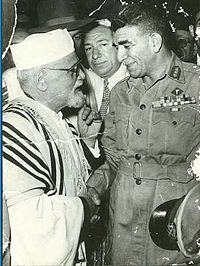- Chaim Nahum
-
 Chaim Nahum with President Muhammad Naguib in 1953
Chaim Nahum with President Muhammad Naguib in 1953
Chaim (Haim) Nahum Effendi (Hebrew: חיים נחום; Arabic: حاييم ناحوم) (1872–1960) was a Jewish scholar, jurist, and linguist of the early 20th century. He was born in 1872 in İzmir. He was sent by his parents to a yeshiva in Tiberias, after which he studied at a French lycée for his secondary education and obtained a degree in Islamic law in Istanbul. Thereafter, he attended a rabbinical academy in Paris, from which he received his semicha. At the same time, he studied linguistics, history, and philosophy at the Sorbonne's school of oriental languages.
Upon his return to Istanbul, Nahum occupied various teaching positions, including at the Turkish military academy. While there, he became acquainted with many of the leaders of the Young Turk movement, who gained power in 1908.
In 1909 Nahum succeeded Moses Levi as Hakham Bashi, or chief rabbi, of the Ottoman Empire. During the peace negotiations following Turkish War of Independence that followed World War I, Nahum was a member of the Turkish delegation that signed the Lausanne Treaty. For his services to the Turkish government he was given the title of efendi.
In 1923 he received an invitation from Moise Cattaoui Pasha, head of the Jewish community of Cairo, to become chief rabbi of Egypt. He was appointed a Senator of Egypt's Legislative Assembly and was a founding member of the Royal Academy of the Arabic Language. Among his many scholarly works was a translation into French of all Ottoman firmans, or edicts, sent to the governors and rulers of Egypt by the Sublime Porte from the Turkish conquest of Egypt in 1517 until the late 19th century.
His works on the history of the Egyptian community are of particular import. In 1944 he helped to reconstitute the Société d'Etudes Historiques Juives d'Egypte (Society for the Historical Study of the Jews of Egypt) and served as its honorary head. Rabbi Nahum was also active in international affairs, assisting in the establishment of contacts between Jews throughout the world. He visited Ethiopia and arranged for several Ethiopian Jews to study in Egypt. Until the German occupation of Rhodes, he was a great supporter of the Sephardic yeshiva on the island and sent many young men to study there.
The rise of Arab nationalism in the late 1940s and early 1950s led to increased economic and political hardship for Egypt's Jewish community. Hundreds were arrested and interned for "Zionist activity". Jewish businesses were confiscated, Jewish bank accounts frozen, and exit visas could be approved only by a special government agency for Jewish affairs. Nahum attempted to ameliorate the effect of these developments for his community with mixed success.
In 1947 Nahum was ordered by the Egyptian government to publicly denounce the Zionist movement. His denunciations, such as they were, were so vague and short as to be meaningless. He utterly refused to have prayers recited in Egyptian synagogues for the victory of Egyptian forces over the fledgling State of Israel during the 1948 Arab-Israeli War.
Around 1950, at age 78, Nahum became totally blind, but continued to carry on his duties as best he could. He continued to officiate at the Shaar Ha Shamayim synagogue, and could give long quotations from the Hebrew Bible and rabbinical texts from memory. However, he became greatly depressed by what he realized was the inevitable decline of Egyptian Jewry. Suffering from increasingly severe medical ailments, he finally succumbed in 1960 at the age of 88. He was buried at the Bassatin cemetery outside Cairo. Nahum's funeral was attended by thousands, including many Muslims and Christians.
In the decades that followed, much of the cemetery was vandalized and desecrated. Rabbi Nahum's tomb is now inhabited by squatters.
References
- Sanua, Victor D. (March 2002). "Haim Nahum Effendi (1872–1960) Sephardic Chief Rabbi of Egypt". Los Muestros (European Sephardic Institute) (46). ISSN 0777-8767. http://www.sefarad.org/publication/lm/046/17.html. Retrieved 2010-03-07.
External links
- "Photographs of Haim Nahum's encounter with President Muhammad Naguib in 1953 and of Nahum's funeral service in 1960". Al-Ahram Weekly. http://weekly.ahram.org.eg/2008/886/_cu1.htm. Retrieved 2010-03-07.
Jewish titles Preceded by
Moses LeviChief Rabbi of the Ottoman Empire
1909–1920Succeeded by
Shabbetai LeviPreceded by
Masoud Haim Ben ShimonChief Rabbi of Egypt
1925–1960Succeeded by
Haim DouekCategories:- 1872 births
- 1960 deaths
- University of Paris alumni
- Chief rabbis of the Ottoman Empire
- Egyptian rabbis
- Smyrniote Jews
- 20th-century rabbis
- Turkish Jews
Wikimedia Foundation. 2010.
